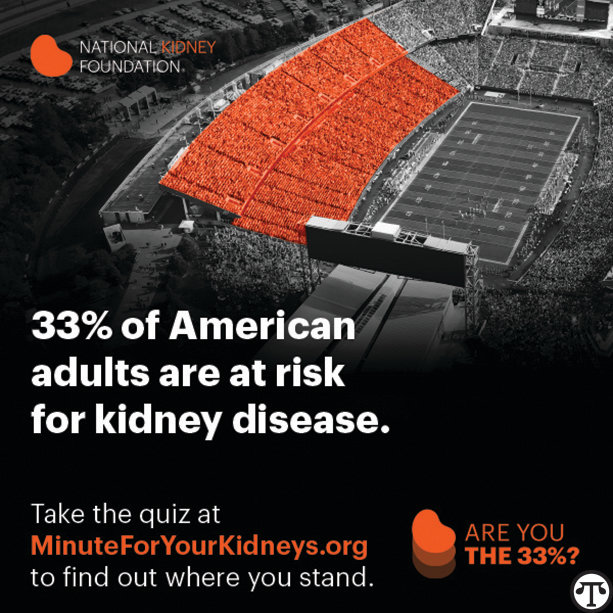You Could Be Part Of The 33 Percent

(NAPSI)—Look around the next time you’re in a crowd. One-third of everyone in there with you is at risk of developing dangerous kidney disease.
Kidney Disease Facts
In the United States, 37
million adults are estimated to have chronic kidney disease—and more
than 90% aren’t aware of it. Often there are no symptoms; they won’t
find out until their kidney’s fail. Kidneys are vital organs—as
important as your heart, liver or lungs—that work 24/7 to clean toxins
from your body. No one can live without functioning kidneys. When
kidneys fail, only immediate dialysis or a transplant can save you.
A Solution
The National Kidney Foundation
(NKF)—the largest, most comprehensive, and longstanding patient-centric
organization dedicated to the awareness, prevention, and treatment of
kidney disease in the U.S.—wants to change the odds. Every adult in the
United States needs to know the risk and can find out with a simple,
one-minute online quiz rolled out for National Kidney Month in March
that can let you know if you’re in the 33 percent—and what to do about
it.
“We have a public health crisis that needs to be addressed by all
Americans,” said NKF CEO and kidney transplant recipient Kevin Longino.
“We will never give up trying to find ways to reach people, slow or
stop the progression of this disease and lessen the burden for patients.
Early testing and interventions are the key.”
What To Watch For
Risk factors for kidney disease are:
• High blood pressure
• Heart disease
• Diabetes
• Obesity
• A family history of kidney disease.
What To Do
If you have one or more of these factors, you should to go to MinuteForYourKidneys.org to find out what to do next and how to talk to your doctor about it.
Life-threatening kidney disease can strike anyone, young or old,
and has many causes, but early intervention can make a difference.
Lifestyle changes and a healthy diet can sometimes slow the progression
of the disease when caught in the early stages, and sometimes can stop
kidney failure.
The first step to preventing kidney failure is knowing your risk,
then getting tested. Two simple tests, one blood and one urine, can let
your doctor know how your kidneys are doing. It’s easy to get tested
yet the results can save your life.
Learn More
For further information about NKF, visit www.kidney.org.

““We have a public health crisis that needs to be addressed by all Americans,” said National Kidney Foundation CEO and kidney transplant recipient Kevin Longino. “Early testing and interventions are the key.”http://bit.ly/2wqAT39”
